Backpacking the Grand Canyon
| by Jason | 11 Comments » | Adventures, North America, United States
We were looking for a challenging outdoor adventure, but we knew we didn’t exactly have the experience to do it safely on our own. Once we decided on our destination, the Grand Canyon, we began researching guided hikes and camping.
The Grand Canyon
The Grand Canyon is a World Heritage Site which encompasses 1,218,375 acres and lies on the Colorado Plateau in northwestern Arizona. Our goal was to experience the Canyon to the fullest; that can only be done by hiking to the very bottom.
The Grand Canyon National Park offers a variety of choices to experience the inside of the Canyon; guided tours, mule trips, river trips, hiking and camping. If you are interested in backpacking and camping on your own, you must acquire a backcountry permit. The permits are very challenging to obtain due to the volume of requests, but the organizations conducting the guided hikes all have access to those permits.
Grand Canyon Field Institute
Our research led us to the Grand Canyon Field Institute, a program of the Grand Canyon Association (GCA), which focuses on educating park visitors about the cultural and natural history of the Grand Canyon. The classes specialize in various topics such as cultural education, photography, wilderness, women, family classes and much more. The term class is used to emphasize education, but this is unlike any class you have taken before. There is a class for everyone; from beginner backpackers to experienced outdoor enthusiasts. The institute was easily accessible via phone and email, and was very courteous while assisting us to choose the class that was best suited for us. We decided on Introductory Backpacking: Colorado River. It was exactly what we were looking for; adventurous, educational, and challenging.
South Rim Lodging
After arriving at Phoenix Airport on a Wednesday evening, we rented the smallest, cheapest car available and drove 3.5 hours up to the Grand Canyon Park that same night. Since we had arrived in the evening we weren’t able to see anything along the unlit highway; however we could easily feel the change in altitude and temperature during our ascent. With complete darkness surrounding us the foot might have been a little heavy on the throttle, because we soon found flashing lights behind us. The officer advised us to slow down so we are able spot the sleeping elk in the middle of the road. That is important information you may want to consider when driving to the Grand Canyon.
Luckily we didn’t see any elk sleeping on the highway, but once we arrived at Maswik Lodge on the Canyon Rim, we did have to maneuver our way around them roaming on the local streets. Maswik Lodge was reasonably priced (about $90USD-$120 per night) considering it is located inside the park and only a 5 minute walk to the South Rim. It was clean and comfortable, but far from a luxury lodge or hotel.
Introductory Backpacking
The next morning we were scheduled to be at the Grand Canyon Field Institute at 8:00am for an all-day Introductory Backpacking class. Our instructor and tour guide, Melanie Miles, was perfect for the job. Not only does she have many years of wilderness experience, but she is very familiar with the ecological history of the Grand Canyon’s formation and shared many hidden treasures with us throughout the trails.
The class was made up of four diverse students. Everyone was new to backpacking and we all socialized rather easily despite our age differences (two classmates were retirees.) During our 1-day course we learned about the history and geological splendor of the Grand Canyon, how to pack minimally and strategically, appropriate clothing, adequate food, water rationing, and a few safety precautions. The most informative was the actual packing list review. As first timers, we brought too much stuff than we needed or could fit in our packs. Not only was there too much, but it would have added unnecessary weight; a topic that is most important when backpacking. The instructor spent time with each person reviewing what items to bring and what items are not practical for the trip. Each student weighed their pack to make sure it was manageable for the duration of the entire trip. The institute also provides equipment rental. Aracely and I both rented hiking sticks and Aracely even rented a backpack that was more than suitable. After downsizing our packing list several times our final pack weight including food was: Jason 42lbs, Aracely 36lbs. It’s important to note that as a couple we were able to minimize our pack weight by distributing a single tent and camping stove between the two of us. After the classroom instruction, the group was led to a beautiful scenic view, Schoscone Point, along the South Rim. We all looked in awe and took pictures of what we were soon about to conquer.
Camping on the South Rim
That evening we chose less expensive accommodations by utilizing the park’s campgrounds. At only $18USD per campsite, we saved compared to the lodge costs. During sunset, we set up our tent in a reasonably sized site, near the public wash house. This provided us a short walk to access restrooms and sinks, making the night’s tasks a bit easier. The temperature on the Rim was about 50 degrees Fahrenheit during the day. Somewhat chilly, but you must remember you are 7,000 feet above sea level. In the evenings the temperature drops significantly. We cooked dinner, washed up and laid our heads to rest, for we knew the challenge ahead. That night, the temperature dropped to 20 degrees Fahrenheit. Fortunately, we were encased in sleeping bags fit to withstand those temperatures.
South Rim Kaibab Trail
Early Friday morning we regrouped with Melanie and the others and began our descent into the Canyon via the Kaibab Trail from the South Rim. Our destination was Bright Angel Campground, which is located next to the Colorado River. The 7.5 miles of switchbacks, unforgiving terrain and breathtaking views took 7 hours to complete. Although the hike was physically challenging for both Aracely and I, it is still possible for many to accomplish. Our group included a female in her 60s who carried her own backpack and was able to cope with the difficult terrain. Our guide, Melanie, was very good at managing the different intensity levels of the team. Rest stops were made as needed, most often along designated areas with public restrooms that were surprisingly clean and adequate. One of the most amazing scenic rest stops is Ooh Aah Point, which is approximately 780 feet from the South Rim. Here, you can take wonderful photos sitting on a ledge overlooking the entire Canyon. As we continued to hike down, Melanie would explain the different vegetations we encountered and pointed out the different layers of rocks that make up the Grand Canyon’s walls. The further we descended the Kaibab Trail the more the temperature increased. Approximately every 1,000 feet in altitude the Grand Canyon weather temperature can change 3-6 degrees Fahrenheit. It is much more efficient to wear layers of clothes that can be easily removed as you become warmer.
Grand Canyon Weather
Carefully consider the time of year you plan your hike. A hike during the summer can begin in 75 degree Fahrenheit weather and finish at 110 degrees once you arrive at the bottom.
Mules
Throughout the trail you will encounter packs of mules making their way to or from the bottom of the Grand Canyon. The mules carry passengers, luggage or even supplies from Phantom Ranch (located at the bottom of the Canyon.) Hikers have the option of a mule carrying their luggage, which will then be waiting for them when they reach Phantom Ranch. These individuals only need to carry enough water and food for the hike down. It was also shocking to see how these mules were able to safely carry passengers while remaining sure footed along the trail. The mule packs create large crevices along the trails that require constant maintenance. Melanie informed us that at one point the park had considered abolishing the mules from the trails, but it was decided that the mules played a significant role in the history of the Grand Canyon. Another fascinating encounter was with the adventure runners that run the trails from South Rim to North Rim across the entire Canyon in a single day.
Bright Angel Campground
When we arrived at Bright Angel Campground we were desperate to remove our bags and rest. The Grand Canyon weather was now a comfortable 85 degrees Fahrenheit. A thorough cleaning in the sink was well deserved to remove the coat of sand on our skin. Everyone set up their tents within a group campsite that provided benches and storage for our food. The storage containers were made of metal to prevent the mule deer from intruding.
Phantom Ranch
Later that evening we visited the famous Phantom Ranch; the only lodging facility below the Canyon Rim. This place has a very cool backpacker atmosphere; everyone is very friendly and social. The grounds include dormitories and rustic cabins, which can be reserved while spending several days on the Canyon floor. Much of the lodging includes showers and restrooms. Also popular is the Phantom Ranch Canteen where meals, beverages, and snacks are available. With reservations, you can participate in family style dining in a log cabin setting. And yes, the beverages do include beer. Just remember the more you drink, the more weight the mules have to carry out. The Canyon floor can only be accessed by foot, mule or the river. Everything you eat and dispose of is transported out by way of mule. After some socializing, we retreated to our tents for a good night’s rest, one that would be considerably warmer than the previous night.
Indian Granary & Havasu Falls
The following morning we had an exploratory hike to a great lookout point above the river where we had lunch. We also went exploring to a 1,000 year old Native Indian granary. Melanie explained the different food storing techniques the Native Indians used. The group learned so much from Melanie during our hikes which combined education and adventure. Another option available to the group was a trek to Havasu Falls. These waterfalls are described as having a bluish green tint to the water and are located above the campgrounds.
South Rim Bright Angel Trail
After two nights of camping at Bright Angel, we began the hike ascending from the Canyon floor. This time we would climb out via the Bright Angel Trail.
Indian Gardens Campground
Four and half miles later we arrived at Indian Gardens Campground for one last night out in the wilderness.
A river runs through the campground which provided great scenery during the hike to the campsite. Indian Gardens also serves as a resting stop for the mule herds between Phantom Ranch and the South Rim.
Plateau Point
That evening, we hiked another 1.5 miles to witness the panoramic views at Plateau Point. During our walk we encountered mule deer willing to pose for photos. The mule deer just couldn’t compare with the most brilliant sunset against the red rock of the Canyon. We stood in awe as the rock glowed with orange and red tints.
The Climb Out
On the last morning at 7:00am, we began our final hike back to the South Rim. The trail from Indian Gardens consists of endless switchbacks with steep stair-like rocks. It was the most strenuous leg of our hike. Determined to beat the class record, we left our group behind and pushed ourselves to climb 4.5 miles in under 2.5 hours. We felt exhausted, but extremely accomplished. It is advisable to hike at a pace that is manageable based on your physical condition. For Aracely and I, it was great a challenge, and an unforgettable experience.
After returning our equipment we began our drive back to Phoenix. Daylight provided us the opportunity to see the beauty of the landscape we missed on our initial drive to the Grand Canyon. Taking a photo next to a giant cactus was just another highlight of the trip and it was a perfect ending to our outdoor adventure.
Other great hikes you might enjoy from the Americas:
If you enjoyed this post, make sure you subscribe to my RSS feed!Tags: Arizona, backpacking, blogsherpa, camping, canyons, hiking, Lodging, North America, USA
















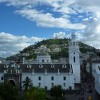
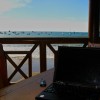
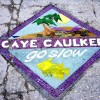

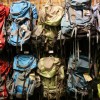
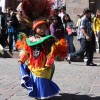
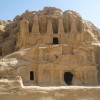
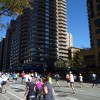
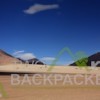
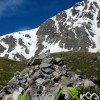
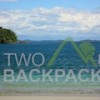



What a great trip. I am going to Arizona in Aug I am going to see the grand canyon the lazy way. But now that I read this story for sure will try to make a trip going backpack through it but I like it to be with a group this suggested group sound good will keep a note of it. I was born in Arizona but never saw it since I was 2 years old. Once I had my mind set on seeing it. I will do different the next time. I want to spend sometime there in the future to stay a few months and explore it kind of trying to look for a home that I would like to seattle in. It will all depend on my upcoming trip. Great post.
Lilly, thanks for the comment. If you do plan to visit the Grand Canyon, I highly recommend entering the Canyon itself. If you don’t plan to hike to the bottom, you can always consider a light day hike that descends just enough to get some spectacular views.
Thanks for the review. I appreciate that you’ve done your hike so recently. I’m preparing for a GC R2R in Sept with GCFI and making some of my preparations. I’m in good shape and confident of my preparations so far but I ‘m still a novice for overnight camping. I have a few questions maybe you could comment on. Did you partake of any of the meals at Phantom Ranch in lieu of packing that dinner/breakfast/lunch? Did you pack an H2O treatment tablets/filter for contingency? If I bring a Jetboil stove/cooking system, does the store have fuel available for it? Any need for a trowel? Any encounters with scorpions or mice while sleeping in the open? Thanks in advance for sharing your experience and taking the time to answer.
Hey Kip, thanks for posting, here are some answers to your questions: The Phantom Ranch does serve family style dinners at night where everyone eats the same thing. We didn’t partake in the dinners, but you absolutely can. It was a little pricey, but mostly due to the difficulty of getting food in and out of the canyon. However, we did enjoy some beers in the canteen room at night. It was a great place to socialize and meet other hikers. There wasn’t any need for water tablets. Each campsite you arrive at has clean water to drink from. The stores near the rim do have fuel for the JetBoil. We had no problems with bugs or mice at any of our campsites. This may be different for backcountry hikes, but you won’t be doing that, so there is no worries. Each campsite has accessible water and bathrooms. There won’t be any showers available unless you are staying in a dorm in Phantom Ranch. You won’t need a trowel either. There were bathroom stops along the trail down to Phantom Ranch. I would assume the same applies climbing back up to the other rim. GCFI is a great organization. Aracely and I will be heading back someday for a Rim to Rim journey as well. Please comment back and tell us how your trip was. Enjoy!
What sites can I use to locate other hikers that may be doing a R2R in July 2025? I may be going with just one other person and would like to be in a group this time. I hiked to Phantom August 2025.
Just went to the Grand Canyon on our honeymoon. Phenomenal trip! I really wanted to hike a little bit of the Bright Angel trail but I’m not gonna lie….my husband (whom i love dearly) is a little bit of a princess and didn’t want to do it!! Siiiigh.
Thanks for the trip report. I’ve always wanted to visit the Grand Canyon especially since it’s been voted as one if the seven wonders. I wanted to have an adventure hike in a controlled environment and your report showed how it is possible. Thanks
It was a great way for us to experience backpacking for the first time and get an education of the Grand Canyon at the same time. It wasn’t cheap, but at the time, it was just a vacation for us, and we had the money to spend.
The giant cactus that Aracely is standing next to is a Saguaro. It truly is a giant as it can reach a height of 50 feet. I was told that the cactus is at least 75 years old before the first arm appears. It is also indigenous to the Sonoran desert. Your photographs truly bring joy into my life. Thank you so much.
Marlene, thanks for the info. We have so many flowers and plants of which we have no idea what their names are. These cacti all along the highway between Phoenix and the Grand Canyon are incredible.
I’m so glad I came across this post! We are planing a trip to the Grand Canyon for a week during Christmas. This is packed full of great information for our trip! Cheers!